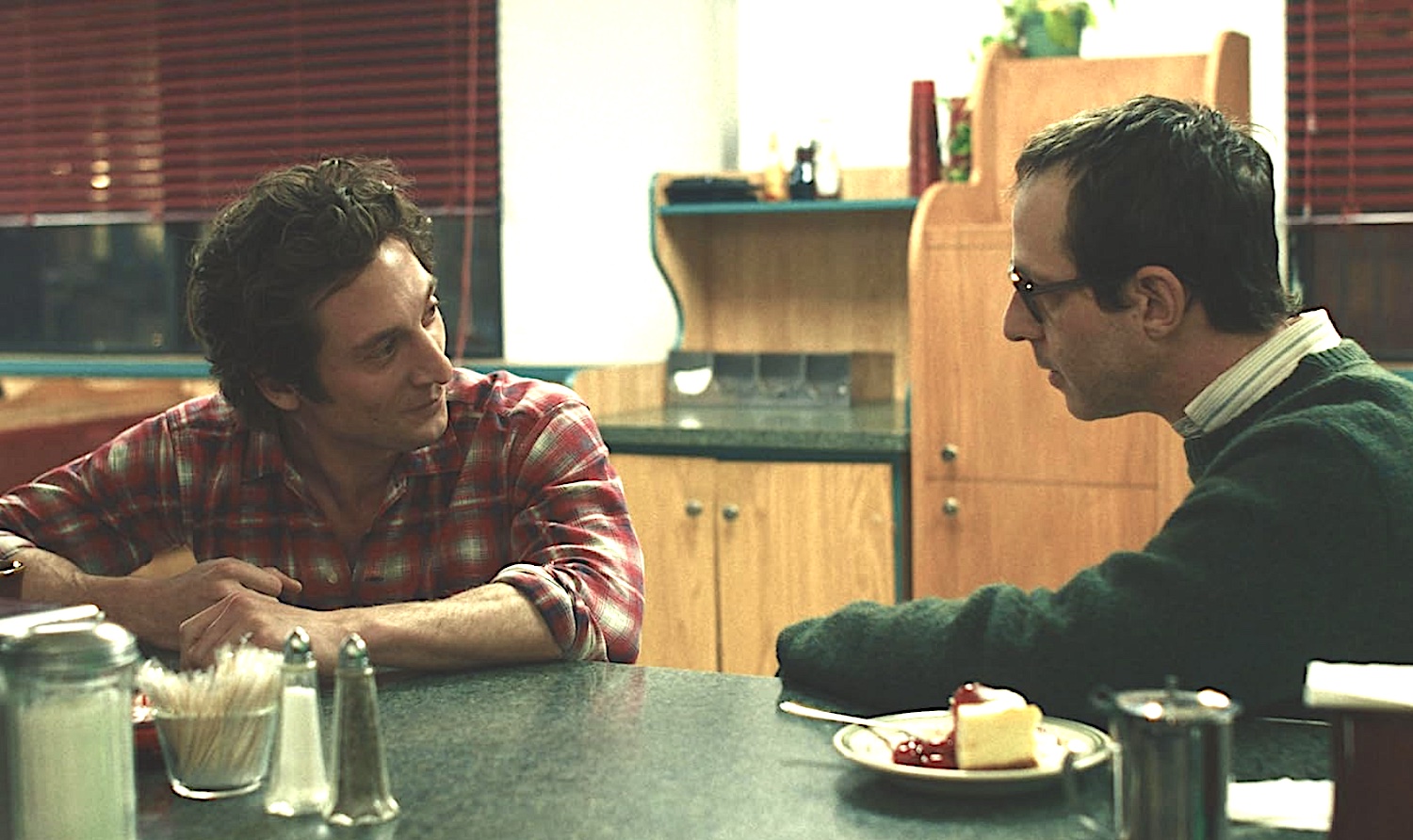Is This Thing On?
Bradley Cooper has previously directed A Star Is Born and Maestro, but they weren’t nearly as much fun as this. It’s a story of New Yorkers in the throes of mid-life crises, as Alex Novak (Will Arnett) separates from his wife Tess (Laura Dern) and finds himself floating in unfamiliar new waters. Their divorce also has a perverse knock-on effect on the lives of their close friends, Christine (Andra Day) and Balls (Cooper), who both start suffering from copycat syndrome.
The joy of the piece (written by Cooper, Arnett and Mark Chappell and loosely based on the life of Liverpool's own John Bishop) is the way that what seems like an ending turns out to be a fresh start, as Alex stumbles almost accidentally into a new career as a standup comic. The device of having him improvise self-analysis in front of an audience is an ingenious way of sketching in details of story and character, while his improving comic skills, and the presence of a batch of real-life New York comics, deliver a dose of genuine laughs. Meanwhile Tess, a former Olympic volleyball player, has been on a self-discovery journey of her own. There’s a wonderful moment where the camera settles on Dern’s face as it registers doubt, confusion and finally unalloyed delight – hey, Academy, are you paying attention?
 The Chronology of Water
The Chronology of Water
Putting her Twilight Saga days firmly behind her, Kristen Stewart (pictured above right with Imogen Poots) makes her directorial debut with this powerful and often disturbing treatment of Lidia Yuknavitch’s eponymous memoir. You might say she jumps in at the deep end, since Yuknavitch was potentially an Olympic swimmer before drugs and alcohol torpedoed her sporting prospects. Aptly, the film opens with a scene of a bloodied woman in a swimming pool, with a cacophonous muddle of noise on the soundtrack which renders dialogue inaudible.
It’s a skilful way of signposting the trauma and confusion of Lidia’s upringing, which was dominated by her abusive and judgmental father. He’s chillingly played by Michael Epp as an uptight preppy type with short hair, glasses, shirt and trousers, seemingly reasonable until he lapses into one of his frequent bullying rages. Her mother resorts to anaesthetic doses of alcohol to survive. Her daughter is driven to compulsive masturbation.
Relationships don’t come easily to Lidia, and her first husband exasperates her with his passivity and pseudo-James Taylor songwriting. The challenge and discipline of swimming provides a temporary refuge until Lidia self-destructs, and a miserable episode of a stillborn baby is her low-water mark.
It’s then that Lidia finds her true calling as a writer. After a few false starts, her participation in a collective novel-writing project with counterculture legend and Acid Test guru Ken Kesey (a big, burly performance by a grizzled Jim Belushi) unlocks her writerly gifts. Episodes of lesbian sex and S&M find her testing her boundaries, while readings of her impenetrable free-form work test ours.
It’s not always pretty, but Imogen Poots delivers a brave and committed performance as Lidia, and if Stewart occasionally gets a little too gratuitously experimental, this is a feature debut to be proud of.
 Springsteen: Deliver Me from Nowhere
Springsteen: Deliver Me from Nowhere
Derived from Warren Zanes’ 2003 book, this isn’t your typical rags-to-riches rock star biopic. Instead it’s a sombre study of Bruce Springsteen suffering a mid-career crisis which prompted him to write the songs eventually released on his album Nebraska (1982), a bleak, stripped-back collection which felt as though it had been written 100 years earlier. The Boss had just enjoyed an international hit album with The River and a huge follow-up tour, but found himself emotionally burned out, both from his burgeoning success and the accumulated baggage from a difficult childhood. Much of the latter centred round his hard-drinking, violent father Doug (Stephen Graham).
Scott Cooper’s painstakingly-wrought film traces the way Springsteen wrote the Nebraska songs and recorded them solo on a lo-fi TEAC four-track cassette recorder, and refused to record a follow-up album with the E Street Band until his label, Columbia, released Nebraska in all its unvarnished rawness. The label, thirsting for a blockbuster commercial product, thought he was insane. As record exec Al Teller (David Krumholtz) puts it, “he’s made a fucking folk album?”
Jeremy Allen White (The Bear etc) gives a quietly intense performance as the troubled, introspective Springsteen, frequently playing opposite Jeremy Strong (both pictured above) as his astute but slightly creepy manager Jon Landau. He also makes a pretty convincing shot at Bruce’s singing voice. But the film suffers not only from the absence of an ending – it just drifts to a halt – but also from an irritating sense of self-regard, as if even an emotionally disturbed Boss must only be treated with semi-mystical awe. This is typical of Landau’s controlling micro-management of his artist, but doesn’t help to create riveting drama. I hope they're not planning to make a movie about each Springsteen album.
 Alpha
Alpha
Written and directed by Julia Ducournau, Alpha is a provocative mix of drama, social observation and pandemic horror story, filmed in a grimy but unnamed French city (though much of it was shot in Le Havre). The story circles around 13-year-old schoolgirl Alpha (Mélissa Boros), who lives alone with her mother (Golshifteh Farahani), a doctor at the local hospital. The action goes into overdrive when Alpha gets herself a tattoo at a party, triggering convulsions of panic in her mother in case she’s contracted “the virus” from a dirty needle. The virus is never named, though it seems to be transmitted in the same way as Aids. However, as well as causing patients to wither and die, it has the horrific effect of calcifying their bodies into a brittle, marble-like substance.
The resulting aura of fear and impending doom gives Ducournau a fraught crucible within which to examine issues of prejudice, paranoia and racism in a society being torn from its moorings. Virus victims become social outcasts (Alpha causes mass hysteria when she bleeds in a crowded swimming pool), while her uncle Amin (Tahar Rahim, pictured above with Boros) not only has the virus, but is a hopeless junkie whose addiction has become uncontrollable. Alpha and her mother are able to find some security within their extended Moroccan family, but there’s a disturbing sense of civilization beginning to crumble around them.
 Wasteman
Wasteman
You might think there’s not a lot of mileage left in the good old prison drama, but in Wasteman, director Cal McMau has created a taut and punchy film from the story of two diametrically different men in a cell. Taylor (David Jonsson, pictured left) is a junkie who’s been inside for 13 years, has a son who he has barely met, and has subsided into a passive, lethargic state. However, an unexpected beam of light shines down on him with the news that he has become eligible for early release, not because of his exemplary behaviour but to ease chronic prison overcrowding. He’s so punch-drunk from his years inside that he barely registers much reaction. However, before he can leave, he has to cope with his new cell-mate, Dee (Tom Blyth). A menacing, macho thug, he blasts into Taylor’s world in a whirlwind of dynamic activity, installing his own large TV and air-fryer and running a brisk business selling assorted food and clothing. It’s as if Taylor doesn’t exist, and Dee treats the warders with abrasive contempt.
Dee’s bombastic presence upsets the prison ecosystem and makes him a target for some rival inmates. When they come to the cell and beat Dee badly enough to send him to the prison hospital, Taylor, to his shame, is too weak and timid to stop them. Once recovered, a vengeful Dee demands his pound of flesh from Taylor. His terror is palpable, he has no reserves of assertive masculinity to draw on, and an ugly fate looms. Driven by its two strong leads and McMau’s tightly-focused direction, this flick should go far.















Add comment